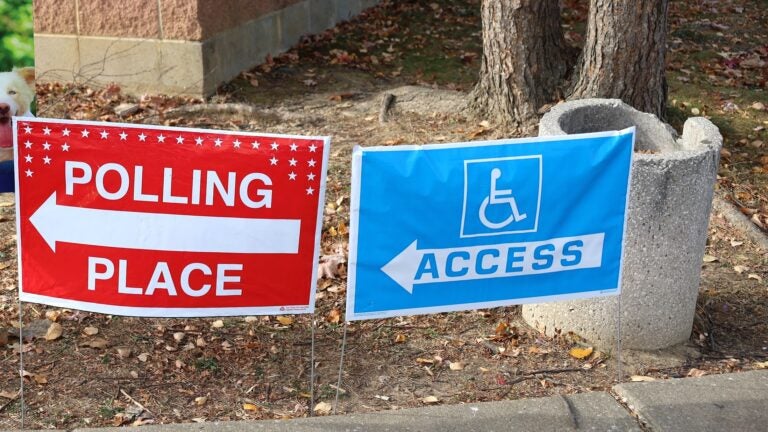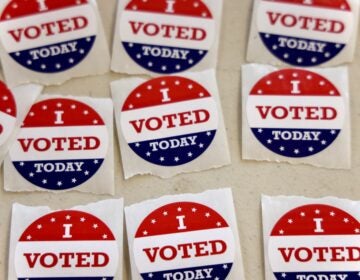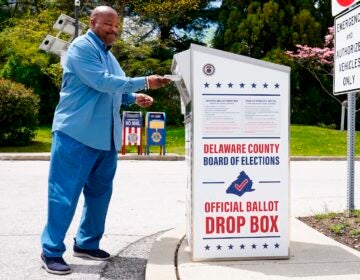Voting rights: Pennsylvania, New Jersey and Delaware voters, here’s what you need to know before hitting the voting booth
Tuesday is Election Day. Here is what you can or cannot do while casting your ballot.
Listen 1:10
Signs direct voters to the front of an early voting site in Wilmington, Delaware. (Sarah Mueller/WHYY)
What questions do you have about the 2024 elections? What major issues do you want candidates to address? Let us know.
Election Day is almost here. Your right to vote is enshrined in the Constitution and is the cornerstone of democracy.
But, there are things you need to know before you cast your ballot on Tuesday, Nov. 5. For starters, certain states don’t allow campaign clothing or pamphlets. Here are your rights and duties as a voter in Pennsylvania, New Jersey and Delaware.
Pennsylvania
In the Commonwealth of Pennsylvania, it is illegal for any person or corporation to intimidate or coerce voters in polling places in favor or against a particular candidate or political issue.
For people with limited English proficiency, interpreters are allowed in the voting booth to help translate ballots and cast votes.
Each polling place must have a voting system that is accessible. If you cannot enter the voting booth or use the system due to a disability, you can select a person to assist you in casting your vote.
A pre-trial detainee awaiting trial in jail on felony or misdemeanor charges can vote. Voting rights are not extended to pre-trial detainees who are sentenced to or are currently serving a felony sentence. Misdemeanor convictions have no effect on someone’s ability to vote unless it was for violating the Pennsylvania Election Code.
People with felony convictions can vote if they were released or will be released from a correctional facility by the next election.
Parolees, even those living in a halfway house, are allowed to vote. Those on house arrest can also cast a ballot, regardless of conviction status.
While election officials and poll watchers are not permitted to wear any type of campaign swag, voters are permitted to wear buttons and t-shirts, but they can’t campaign for their chosen candidate or an issue while in the polling place. Campaign literature is allowed inside the booth, but it must be removed by the voter when they leave.
In the Keystone State, voter fraud or any election related anomaly can be reported by filling out an online form or contacting election officials in the concerned county. Residents can also call 877-VOTESPA (877-868-3772).
New Jersey
The Garden State has a Voters’ Bill of Rights, which outlines what voters can expect at polling places along with resources available.
While casting their ballot, voters have the right to vote in private, bring in a sample ballot and take a “reasonable” amount of time. Instructions on how to use the voting machine are available in polling places. If you don’t see them, ask any poll worker.
Like in Pennsylvania, New Jersey has support for voters with disabilities and they can also bring someone to help them as long as the person is not a representative of their employer or union. If a disabled voter shows up alone, two poll workers of opposite parties may help. A poll worker must fill out a disability certificate before using a machine.
Garden State residents who are not in incarceration as a result of a conviction of any indictable offense can vote by completing a new voter registration form. Also, anyone who is on parole or is awaiting trial, even in jail, can vote.
New Jersey is also one of 21 states that restricts wearing campaign swag at polling places. A voter at a polling place in Hamilton Township garnered media attention for throwing a tantrum when she was forbidden by poll workers from entering the polling station because of what she was wearing.
You cannot enter a polling place or stand within 100 feet of the outside entrance of a polling place “wearing or displaying anything that may offer support for or opposition against any candidate, party or public question on the ballot,” including “political badges, buttons, insignias, t-shirts, hats or other display that can be read or viewed to identify support or opposition of a candidate, political party or public questions.”
The state’s law against electioneering is spelled out on a new poster the Division of Elections displayed during early voting for the first time on Oct. 26.
Complaint forms are available for voters at every polling station. Voters can call 877-NJ-VOTER (877-658-6837) for any voting questions.
Delaware
A brief overview of accessible voting options is described in this video on the Delaware Elections YouTube page. Each polling site is surveyed by state elections staff to ensure that it is accessible.
Similar to surrounding states, those who need assistance in casting their ballot can take someone to assist them. In addition, at least one universal voting console is available at each polling place
Delaware’s voting machines, the ES&S ExpressVote XL, are fully compliant with the Americans with Disabilities Act and have been in use since 2019.
A person convicted of a felony can vote if their sentence has been fully discharged and if they were not convicted of a disqualifying felony as stated in the state’s constitution. The disqualifying felonies include murder and manslaughter, with the exception of vehicular homicide. The exclusion is also extended to offenses against public administration involving bribery, improper influence, abuse of office or a sexual offense.
The First State is also among the 21 states that restrict electioneering.
Campaigning and wearing anything that supports or opposes a candidate or issue is prohibited within 50 feet of a polling place.
Delaware outlines its procedure to file a complaint if you believe your voting rights have been violated. The complaint must be submitted to the Office of the State Election Commissioner or any of the county elections departments. It must be in writing, notarized and signed and sworn by the voter.

Get daily updates from WHYY News!
WHYY is your source for fact-based, in-depth journalism and information. As a nonprofit organization, we rely on financial support from readers like you. Please give today.






